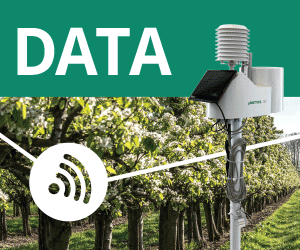Some fruit growers may have heard about the outbreaks of a new plant pathogen in mainland Europe called Xylella fastidiosa. This has potential implications for several fruit crops in the UK. AHDB Horticulture has discussed the current situation with the government’s Animal and Plant Health Agency.
Xylella fastidiosa is a bacterial pathogen which affects a range of woody and herbaceous plant hosts. The bacterium is transmitted by leafhoppers and sets up infections within the xylem (water conducting) tissues of the host. This leads to several possible symptoms including leaf scorch, plant stunting, wilting and dieback. Xylella fastidiosa has already been found in France and Italy, where it has been found to kill olive trees within two years. For the UK fruit industry, there are statutory implications for Prunus (cherries) as the disease has been confirmed in Prunus in outbreaks of the disease outside the UK. Rubus (cane fruit), Fragaria (strawberry) and Vaccinium (blueberry) species are also known to be hosts of the pathogen, although it has not yet been diagnosed on these hosts in outbreaks. It is also feared that the pathogen could seriously affect nursery stock production and also urban and countryside landscapes.
Because of these potential risks for the UK horticultural industry, the government’s Animal and Plant Health Agency (APHA) is working hard to prevent and intercept outbreaks in this country. Where the disease is found on individual plants that can be traced back to a recent arrival at the site, the Plant Health Service will carry out an ‘interception’ which would require destruction of the host plants and any potential hosts in close proximity. Should an ‘outbreak’ occur, where the disease is found on plants that are established on the site and has spread, the Plant Health Service will order a destruction of all Xylella known hosts plus other plants which may be infected within 100m of the infected plants. They will also impose plant movement restrictions within a buffer radius of 10km for a minimum of five years.
All Prunus (cherry) plants being brought into the country from the EU must be pre-notified to APHA. Anyone importing host plants (including cherry) from the EU needs to ensure that they are accompanied by a valid plant passport confirming they have been sourced from disease free areas/sites. Growers should therefore ensure that plant passports arriving with plants are correct and keep the passport to aid ‘trace back’ if necessary. Growers should also source all their plants from known suppliers or visit suppliers to view their processes, procedures, bio-security arrangements and the plants they grow. They should also ensure that all imported plants both originate from and are sourced from disease free areas.
At present, there are no statutory implications for Rubus (cane fruit), Fragaria (strawberry) or Vaccinium (blueberry) in the UK and no requirement for plant passports. However, growers should take an active interest in the source of all plants they import and satisfy themselves of their required health status.
More comprehensive information about Xylella fastidiosa with useful links to information on the EU areas currently affected, is available at the following website: www.gov.uk/guidance/protecting-plant-health-topical-issues
Photo credit: AHDB














